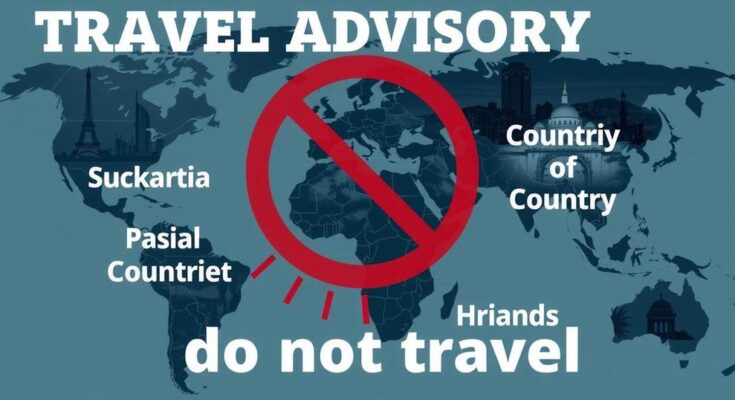The U.S. Department of State has listed South Sudan among the highest-risk countries under its ‘Do Not Travel’ advisory, citing severe issues such as violence, crime, and instability. This designation poses a significant threat to South Sudan’s fragile tourism sector, as reduced flights and foreign investment are anticipated. The situation reflects a growing trend of global travel advisories impacting safety and tourism dynamics in multiple regions, necessitating a reassessment by travelers and businesses alike.
The U.S. Department of State has recently added South Sudan to its highest-risk “Do Not Travel” list, joining nations such as Yemen, Venezuela, Russia, Libya, Ukraine, the Central African Republic (CAR), and Haiti. This classification is due to escalating issues including violence, armed conflict, crime, and kidnappings, effectively rendering South Sudan an unviable destination for travel. Consequently, this will significantly impact the already fragile tourism sector, leading to reduced airline flights, unavailability of travel insurance, and declining foreign investment in hospitality.
The travel advisory comes in light of growing global instability, with various regions experiencing disruptions due to conflicts, kidnappings, and terrorism. While such advisories are issued primarily for security concerns, their implications are profound, affecting local economies and global travel trends. South Sudan has long been characterized by political instability, ethnic violence, and ineffective governance, with recent orders for the evacuation of non-emergency U.S. personnel further signaling the decline in safety conditions.
The advisory highlights severe risks of violent crimes, including carjackings, shootings, and armed robberies, as armed groups remain active throughout the nation. The accessibility of weapons increases the danger of sudden attacks, particularly for foreign nationals, including journalists, who face the threat of harassment or violence when reporting on local issues. Consequently, the advisory has eliminated any substantial hope for tourism recovery in South Sudan, which, despite its potential for wildlife and cultural tourism, is now deemed too perilous for visitors.
Tour operators specializing in adventure and wildlife tourism are expected to experience a significant decline in bookings, contributing to operational challenges as airlines may reduce or suspend flights to the region. This downturn will inevitably affect tourism-related businesses, such as hotels, tour guides, and transportation services, leading to heightened difficulties in sustaining operations. Moreover, foreign investors, wary of the risks associated with nations on this advisory list, are likely to withdraw or halt any prospective tourism development initiatives.
Visitor demographics to South Sudan largely comprise aid workers, journalists, and business professionals. However, with the heightened advisory, the risk for even these groups has increased, prompting many organizations to reconsider or cease their operations in the country altogether. South Sudan now joins a concerning list of countries facing strict U.S. travel advisories, each suffering from security challenges that have severely impacted tourism and business ecosystems.
Countries such as Yemen face extreme danger due to terrorism and ongoing civil war, with the U.S. Embassy in Sana’a closed since 2015, leaving American nationals without consular support. Venezuela continues to be a high-risk area due to arbitrary detentions and rampant crime, and similar issues plague Russia, Libya, Ukraine, the CAR, and Haiti, where political instability, violence, and insecurity dominate the landscape.
The inclusion of South Sudan on the U.S. “Do Not Travel” list highlights a concerning trend in global travel. The rise of conflicts and crime across numerous regions is transforming the tourism sector, compelling stakeholders to navigate a new reality where entire nations are considered off-limits. Travelers and businesses must evaluate their plans carefully, while affected countries navigate a complex path forward amidst increasing volatility in the global landscape.
In summary, South Sudan’s addition to the U.S. ‘Do Not Travel’ list underscores the growing risks associated with global tourism. The advisory not only eliminates South Sudan as a feasible travel destination but also exemplifies a broader trend in which multiple countries face similar advisories due to violence and instability. As the travel industry grapples with these realities, stakeholders are urged to reassess their engagement with affected regions while recognizing the significant economic implications for local tourism sectors.
Original Source: www.travelandtourworld.com




